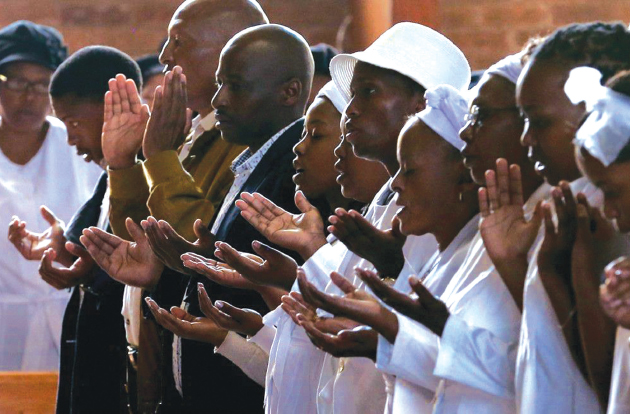Christianity needs fresh Reformation


In some cases, Christian leaders have become gods in their own right, vested with unbridled authority, with unquestioning multitudes at their command
Stanely Mushava Review Correspondent
A series of bizarre rites, commonly legitimated as miracles, have been trending in the Christian fold. Within the same space, preachers have taken consumerism to scale, enhancing everyday products with “anointing” and selling them in church with effortless success.
In the latest instances, “value-added” commodities, including anointed pens to nail the exam and anointed condoms for a more vigilant firewall, have been sold out in churches over the recent weeks.
On the other hand, bizarre rites, all in a year’s work, however, border more on manipulation than merchandise.
These include a pastor walking on congregants, directing followers to eat grass, eating snakes, killing congregants to resurrect them, and ministering sex-based deliverance.
While a definitive scriptural case can be made for miracles and revelation, conformity to the message of the Bible is the known condition.
How the afore-cited miracles are supposed to further the Gospel, give glory to God or improve the state of humanity is too difficult a conjecture to hazard.
A margin of sensationalisation might be allowed in few of the cases, considering that media can be agenda-driven against sects or profit-driven against facts, but at least two disturbing common denominators seem to run the thread.
The first is an inordinate crave for publicity, with some of the emerging preachers bent to controversy just to attract attention to their denominations.
It seems the pastors are determined to be the material for memes, and to have cameras flashing into their faces, whatever the values at stake.
Just that the cost of such desperation often feeds into stereotypes against the entire Christian fold.
Despite the fact that there are thousands of pastors exclusively dedicated to their vocation of winning souls, society is naturally worked up, and the Internet lit up, by the few wayward ones.
There are pastors, including prominent Pentecostal ministers in Zimbabwe, who are engaged in charitable works taking the preaching of the Gospel to scale but the negative ones are often appropriated as a common standard for judging the rest.
Unfortunately, such antics serve to embolden cynics in their baseless hostility towards God. In the history of Christendom, clerical abuses and complicity in historical atrocities has been capitalised by infidels to blame the entire movement.
This, against Saint Augustine’s argument that a philosophy cannot be judged by its abuse!
The second denominator is the unsettling abuse of power by pastors taking advantage of followers’ unquestioning allegiance.
In some cases, Christian leaders have become gods in their own right, vested with unbridled authority, with unquestioning multitudes at their command.
The trend has facilitated a new autocracy whereby an individual’s authority is above all forms of checks and balances, including the ultimate authority of the scriptures.
This explains how some congregants readily yield to financial, sexual, doctrinal and spiritual manipulation. Within some white-garment denominations, leaders are known to appropriate themselves wives and concubines at a tangent in the name of God, including unconsenting women and underage teenagers.
In such sects, the Bible is known as “stale meal,” on the basis of a claim that the church is exclusively led by the Holy Spirit. In other major denominations, class profiling has become a means for social stratification, not subtly, but visibly with congregants seated according to how much they are able to cough into the church coffers.
Questionable meddlers are given standing ovations in the church on the basis of their secular stature, and dancehall artistes known for singing in praise of booze and whores booked as main performers at all-night prayers.
In a televised sermon entitled “Break Your Alabaster Flask”, an eminent Christian minister tells her audience that giving to higher ministers of God rather than giving to the poor is a proven formula to get rich.
It is not hard to imagine what Jesus would make of such a teaching when He clearly taught that those on the right side on judgement are the ones who charitably served the least of His brethren.
The main instruction to Paul from the “reputed pillars” was to remember the poor, while James teaches that pure religion is to minister to the needs of the afflicted.
TheBehaviourReport.com publisher Oscar Habeenzu observes: “There has not been integrity in the local church either, as fruits of foreign currency money changing was seen as prosperity, with preachers praising the dealers and giving them standing ovations, saying . . . ‘see here, this is Godly success.’ Really?”
The money-based traditions fly into the face of Apostle James’s recommendation that the richly apparelled congregant must not be preferred above the shabby one.
“If you pay attention to the one who wears the fine clothing and say, ‘You sit here in a good place,’ while you say to the poor man, ‘You stand over there,’ or, ‘Sit down at my feet,’ have you not then made distinctions among yourselves and become judges with evil thoughts?” Apostle James writes.
“Has not God chosen those who are poor in the world to be rich in faith and heirs of the kingdom, which he has promised to those who love him? But you have dishonoured the poor man,” he reproves.
Chiefly at stake is the integrity of the church, a necessary quality for leadership and public confidence. A lot is happening at once which cannot be justified by reason and creed.
It seems as if making sense of the doctrinal transitions is harder than shooting a moving object in the mist, to borrow Robert W McChesney’s metaphor.
No doctrine seems to be more important to some denominations than the erroneous assumption that leaders are infallible, therefore above any form of checks and balances.
Perhaps the church could benefit by taking heed to TS Eliot’s choruses from “The Rock”at a time when Christianity is concerned about motion but not direction and abounding in knowledge of words but not the Word.
“It is hard to be really useful, resigning the things that men count for happiness, seeking the good deeds that lead to obscurity, accepting with equal face those that bring ignominy, the applause of all or the love of none,” the great poet observes.
“All men are ready to invest their money but most expect dividends. I say to you: Make perfect your will. I say: take no thought of the harvest, but only of proper sowing,” Eliot writes.
It is important that Pentecostalism traces its origins both in the lapse of recent history and at the head of the Christian movement where service was not driven by self-interest.
Pentecostalism and Protestantism, two of the major Christian movements, have run parallel for centuries, sometimes in attrition against each other.
A positive argument can be made that both have been progressively depreciating, in the main, because of their isolation from each other and that it is time the hearts of the fathers were turned to the children and the heart of the children to the fathers.
At the dawn of the Protestant Reformation, the principal argument was the place of the Bible as the all-sufficient authority in Christian conduct and worship, while the Pentecostal Revival, in its varied phases, has been driven by the agency of the Holy Spirit. In the most extreme cases, the two have been almost treated as mutually exclusive – whereas they are by nature inseparable – leading to the debilitating deficiency now apparent in most denominations. There is observable need to go back to the wisdom of that old saying: “If you have the Word but not the Spirit, you dry up. If you have the Spirit but not the Word, You blow up.”
In professing to be led by the Holy Spirit, while elevating human authority above the Bible, new charismatic movements are losing the plot.
The Protestant Reformation challenged the supposed authority of the papacy and the clergy over the scriptures. There can be no better time than the present for the Pentecostal Movement, arguably the main strand of Christianity at the moment, to go the same route.
There is need for a revived “Sola Scriptura, Sola Fide, Sola Gratia,” lest the church lose track of what matters in emphasising motion rather than direction.
- Feedback: [email protected]










Comments